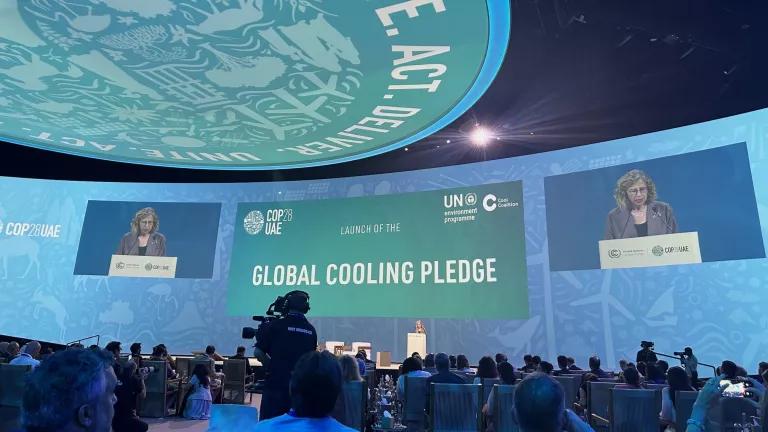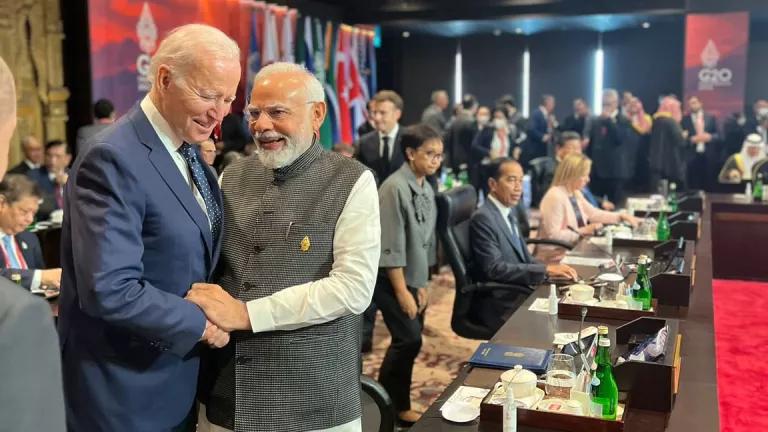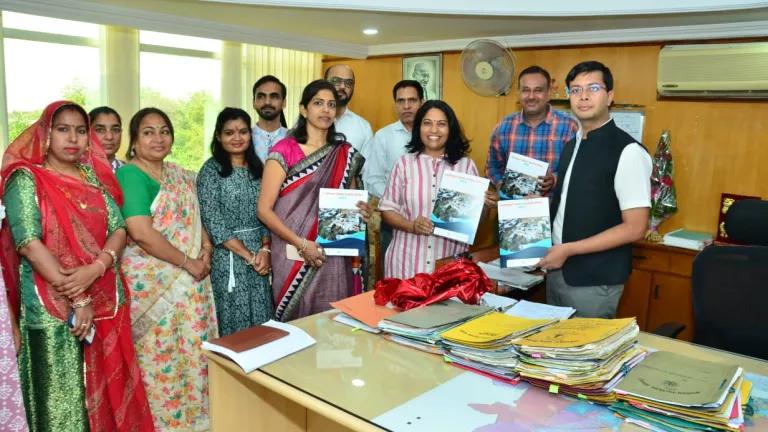India's New Climate Target Could Create 3.5 Million Jobs
Over 3.5 million jobs (short and long term) can be created by achieving India’s newly announced 500 gigawatts (GW) non-fossil electricity capacity goal by 2030, as discussed during an NRDC and partner session in Glasgow.

Climate activists hold up banners during a protest organized by the Cop26 Coalition in Glasgow, Scotland, Saturday, Nov. 6, 2021 which is the host city of the COP26 U.N. Climate Summit.
Co-Authored with Charu Lata
Jobs are a major topic as nations gather during the Glasgow climate talks. Clean energy is proven to boost jobs in India and around the world. India’s stronger climate target announced last week sets the course to achieve the country’s employment ambitions and climate goals. Over 3.5 million jobs (short and long term) can be created by achieving India’s newly announced 500 gigawatts (GW) non-fossil electricity capacity goal by 2030, as discussed during an NRDC and partner session at COP26.
Solar and Wind Energy Create Jobs Worldwide
Labor organizations and environmental groups are emphasizing that jobs must at the heart of climate plans. Nations risk “social rejection” if the discussion on just transition does not safeguard jobs and livelihoods. Over 100,000 people, including many young people, took to the streets in Scotland over the weekend, demanding climate justice with inclusive economic growth that creates jobs.
Clean energy continues to generate jobs worldwide, even with pandemic-related supply chain disruptions. In 2020, jobs in the renewable energy sector grew to 12 million, according to a new report by International Renewable Energy Agency (IRENA) and the International Labour Organization (ILO). Solar and wind jobs continue to lead with a total of 4 million and 1.25 million jobs respectively. China has 39% of clean energy jobs around with world, followed by Brazil, India, the United States and European countries.
Solar and Wind Job Growth in India
Examining India’s new climate target was a highlight during a COP26 event Changing the Climate for the Most Vulnerable: Lessons on Climate Resilience in India, from Green Villages to Cool Cities. NRDC and partners, the Council on Energy, Environment and Water (CEEW) and Skill Council for Green Jobs (SCGJ), released “India’s Expanding Clean Energy Workforce: Opportunities in The Solar and Wind Energy Sectors” during the side event. The new research analyzes the number of direct jobs created from solar and wind in 2020-21 as well as the employment potential for India’s 500 GW target.

The main findings are:
- India can create about 3.5 million jobs (short and long term) by installing 280 GW solar and 140 GW wind capacity out of the 500 GW non-fossil electricity generation capacity goal by 2030.
- Wind and solar energy markets employ a workforce of 111,400 with utility-scale and rooftop solar as the dominant employer with 77% market share in financial year (FY) 2021.
- COVID-19 impacted the Indian renewables by dropping to 48% fewer jobs in FY21 as compared to FY19.
- More than 78,000 trainees have been certified under the national-level solar energy Suryamitra training program between 2015 and 2021.
- The Skills Council for Green Jobs continues to integrate environmental awareness into job training across skilling programs through “Green National Occupation Standards” for the workplace.
A key takeaway is that in India and around the world, smaller scale solar energy, either solar PV or distributed renewable energy create more jobs. These types of jobs are often in rural areas and can offer employment to economically disadvantaged groups that improve livelihoods. Looking more broadly, India’s shift to a net-zero economy could contribute more than “$1 trillion in economic opportunity by 2030, and create 50 million jobs by 2070”, according to a World Economic Forum (WEF) study.

With an average age of 27, economic growth and employment opportunities are a pressing issue in India today and well into the future. India’s new target shows that countries can create jobs, protect health and flight climate change. As the climate talks come to a close this week, more action is needed to fight climate change and create jobs in India and across the world.
Charu Lata is a climate change and clean energy expert, working as a consultant with NRDC based in New Delhi.

Links to NRDC and Partner Green Jobs Peer-Reviewed Publications
- November 2021 India’s Expanding Clean Energy Workforce: Opportunities in The Solar and Wind Energy Sectors
- March 2021 Creating Jobs and Income: How Solar Mini-Grids Are Making a Difference in Rural India
- March 2021 Employment Potential of Emerging Renewable Energy Technologies
- January 2021 It Takes a Village: Advancing Hariyali Clean Energy Solutions in Rural India - Report
- September 2019 Powering Jobs Growth with Green Energy
- January 2019 Worth their Salt: Building Skills and Improving Livelihoods of Women Salt Farmers in Gujarat through Clean Energy Solutions
- June 2017 Greening India’s Workforce: Gearing up for Expansion of Solar and Wind Power in India
- February 2016 Filling the Skill Gap in India’s Clean Energy Market: Solar Energy Focus
- February 2015 Clean Energy Powers Local Job growth in India
- September 2014 Surging Ahead: Scaling India’s Clean Energy Market Through Jobs and Financing
- August 2014 Creating Green Jobs: Employment Created by Kiran Energy’s 20 Megawatt Solar Plant in Rajasthan, India
- August 2014 Creating Green Jobs: Employment Generation by Gamesa-ReNew Power’s 85 Megawatt Wind Project in Jath, Maharashtra
- August 2014 Solar Power Jobs: Exploring the Employment Potential in India’s Grid-Connected Solar Market



